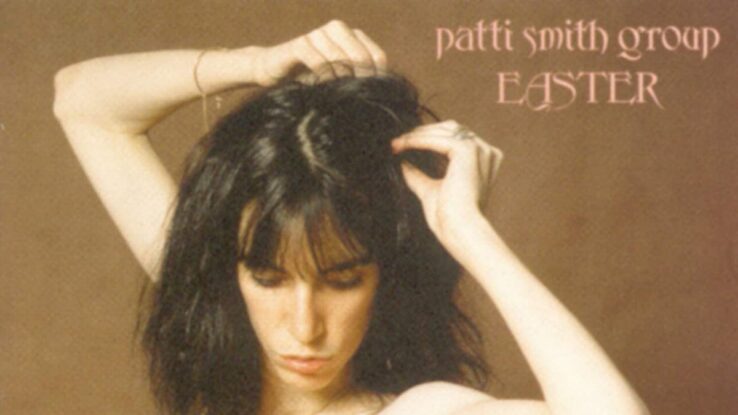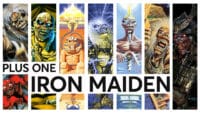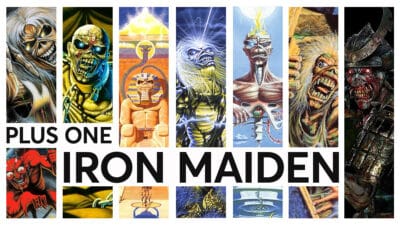Music

Looking back
Patti Smith was reborn on Easter
Easter found Patti Smith rebounding from myriad setbacks to create a record that balanced art with mainstream success
As debuts go, Patti Smith’s Horses takes some beating. “Jesus died for somebody’s sins, but not mine,” Patti croons right out of the gate on Gloria, not so much a cover of the Them song, but more like spray-painting over it, shredding it, and sticking it back into a shape that resembles the original but has utterly reappropriated its meaning.
That’s the thing with Horses. Its songs share lots in common with rock songs, but woven through every single one is Patti Smith, a personality and a voice that just doesn’t sound like anyone else. It’s punk rock filtered through deeply passionate readings of Rimbaud, Burroughs and Ginsberg, music that is more in service to Patti’s phenomenally vivid and romantic lyricism than anything else.
Smith’s follow-up, 1976’s Radio Ethiopia, was a lot less sure of itself. The production on songs like ‘Ask The Angels’ sounded less like Patti Smith and more like an attempt to capitalise on the success of Horses by pushing her towards mainstream rock radio. Critics and audiences weren’t convinced. To make matters far, far worse, while playing in Florida on the ensuing tour, Smith fell 16 feet off the stage into a concrete orchestra pit and broke her neck.
It was a catastrophic end to a disappointing second act for Smith, a sharp downward turn after the highs of Horses. It would take her 18 months to recover, reset and rediscover how Patti Smith and her music fitted into the music landscape of the late 70s. When she returned in 1978 with Easter, the suggestion wasn’t so much that she’d opted for accessibility over art or the other way around, more that she’d figured out how the two could work together.
It’s impossible not to read Easter as a resurrection. Smith has always been drawn towards religious imagery – the very first word she sang on record was “Jesus” – and after the trials of Radio Ethiopia and her injury, the album feels like a moment of rebirth. Key to this is Smith’s biggest hit, ‘Because The Night’.
The song was written by Bruce Springsteen, who was working with Easter producer Jimmy Iovine on his own comeback, Darkness On The Edge Of Town. Springsteen couldn’t get the song to work in the studio, so Iovine took it to Smith, who reshaped it in her own image. What she got was a skeleton of a hit, essentially the music for the verses and one giant chorus. Her lyrics are a cry in the night to her husband Fred “Sonic” Smith. “Love is a ring, the telephone” is a simple, vivid image of that agony of waiting for a call, Patti willing the two of them into each other’s presence, a place where they can be vulnerable and safe: “Take my hand as the sun descends, they can’t touch you now.”
‘Because The Night’ was a massive hit for Patti Smith in a way that Springsteen has suggested it wouldn’t have been if he’d sung it himself. However, Easter doesn’t conform to its lean, direct style. It’s more cohesive than its predecessors, but it’s still eclectic, from the bonfire singalong folk of ‘Ghost Dance’ to the fired-up spoken word of ‘Babelogue’.
Then there’s Smith’s most controversial song, the one that has ignited and reignited debate for decades. Over four incendiary minutes, she takes society to task, drawing lines between Jimi Hendrix, Jackson Pollock and Jesus and screaming: “Outside of society, that’s where I want to be”. Even as the song (un-nameable here) was removed from streaming, Smith has stood by it and her definition of the offending word, intended to mean anyone excluded from society for refusing to fit its norms. It’s hard to interpret her motives as anything other than well-intentioned, but in hindsight, its undeniably naïveté undermined an otherwise powerful song.
Religious imagery is scattered across Easter, from the picture of Rimbaud and his brother making their First Communion to ‘Privilege (Set Me Free)’ adapting the words of Psalm 23. It’s impossible to know if Smith saw the record as her own rebirth or if it’s as simple as rebirth being ingrained in religion and religion ingrained in Patti Smith. The album never seems to look back on Smith’s challenges of the preceding years. As she says herself on ‘Babelogue’, “I haven’t f**ked much with the past but I’ve f**ked plenty with the future.” Easter has its eye far more on what it can do than what’s been done.









